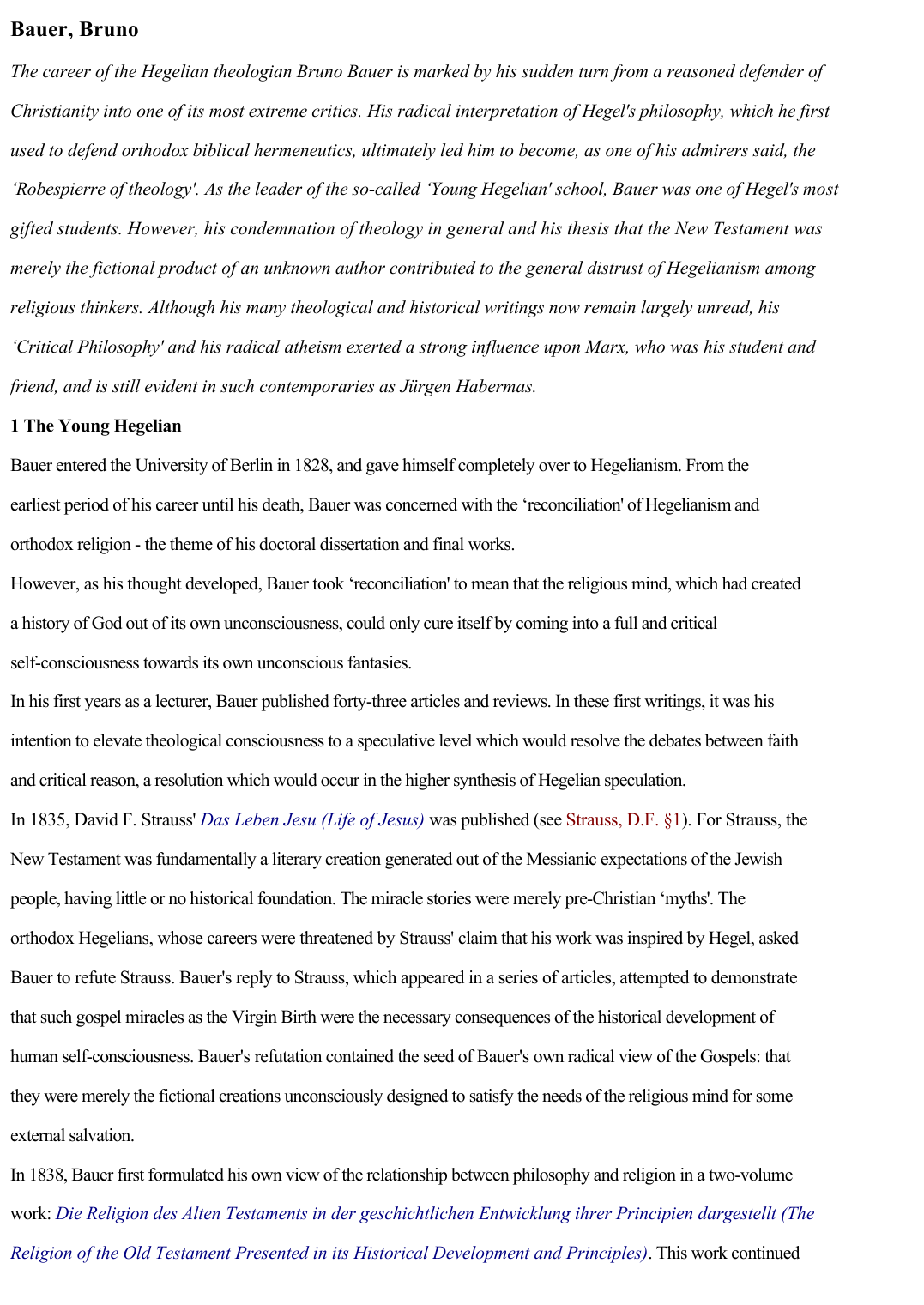Bauer, Bruno
Publié le 16/05/2020

Extrait du document
«
Bauer, Bruno
The career of the Hegelian theologian Bruno Bauer is marked by his sudden turn from a reasoned defender of
Christianity into one of its most extreme critics.
His radical interpretation of Hegel's philosophy, which he first
used to defend orthodox biblical hermeneutics, ultimately led him to become, as one of his admirers said, the
‘Robespierre of theology' .
As the leader of the so-called ‘Young Hegelian' school, Bauer was one of Hegel's most
gifted students.
However, his condemnation of theology in general and his thesis that the New Testament was
merely the fictional product of an unknown author contributed to the general distrust of Hegelianism among
religious thinkers.
Although his many theological and historical writings now remain largely unread, his
‘Critical Philosophy' and his radical atheism exerted a strong influence upon Marx, who was his student and
friend, and is still evident in such contemporaries as Jürgen Habermas.
1 The Young Hegelian
Bauer entered the University of Berlin in 1828, and gave himself completely over to Hegelianism.
From the
earliest period of his career until his death, Bauer was concerned with the ‘reconciliation' of Hegelianism and
orthodox religion - the theme of his doctoral dissertation and final works.
However, as his thought developed, Bauer took ‘reconciliation' to mean that the religious mind, which had created
a history of God out of its own unconsciousness, could only cure itself by coming into a full and critical
self-consciousness towards its own unconscious fantasies.
In his first years as a lecturer, Bauer published forty-three articles and reviews.
In these first writings, it was his
intention to elevate theological consciousness to a speculative level which would resolve the debates between faith
and critical reason, a resolution which would occur in the higher synthesis of Hegelian speculation.
In 1835, David F.
Strauss' Das Leben Jesu (Life of Jesus) was published (see Strauss, D.F.
§1 ).
For Strauss, the
New Testament was fundamentally a literary creation generated out of the Messianic expectations of the Jewish
people, having little or no historical foundation.
The miracle stories were merely pre-Christian ‘myths' .
The
orthodox Hegelians, whose careers were threatened by Strauss' claim that his work was inspired by Hegel, asked
Bauer to refute Strauss.
Bauer's reply to Strauss, which appeared in a series of articles, attempted to demonstrate
that such gospel miracles as the Virgin Birth were the necessary consequences of the historical development of
human self-consciousness.
Bauer's refutation contained the seed of Bauer's own radical view of the Gospels: that
they were merely the fictional creations unconsciously designed to satisfy the needs of the religious mind for some
external salvation.
In 1838, Bauer first formulated his own view of the relationship between philosophy and religion in a two-volume
work: Die Religion des Alten Testaments in der geschichtlichen Entwicklung ihrer Principien dargestellt (The
Religion of the Old Testament Presented in its Historical Development and Principles) .
This work continued.
»
↓↓↓ APERÇU DU DOCUMENT ↓↓↓
Liens utiles
- Biographie de BAUER (Bruno).
- BRUNO, saint
- Gordiano Bruno et l'humanisme
- La Chine par Bruno BelpaireSecrétaire de l'Institut Belge des Hautes Études Chinoises, Bruxelles La littérature chinoise, jusqu'au XVIIIe siècle ap.
- L'oeuvre de Schelling OEUVRES PRINCIPALES :(1800) L'IDÉALISME TRANSCENDANTAL (1842)(1802) BRUNO, DIALOGUE


